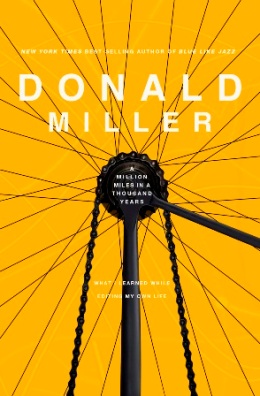 I spent the better part of Friday afternoon reading Donald Miller’s new book, A Million Miles in a Thousand Years. Miller gained a lot of notoriety with the 2003 publication of his second book, Blue Like Jazz, his bestseller to date. His follow-up book (and one I actually liked more than Jazz), Searching for God Knows What, did fairly well, but his next, To Own a Dragon was not a huge success. By Miller’s own admission in this latest book, his career had plateaued and was stalled for a number of years after Jazz, until he was approached by Steve (“Meltdown at Madame Tussaud’s”) Taylor to create a movie script out of the ideas in BLJ. Since it was a series of autobiographical essays, the book–and thus Miller’s life, had to be edited into a narrative for the screenplay. This exercise of editing his life is the substance of Miller’s latest work, and it is quite a revealing and thought-provoking journey we travel with him in the process.
I spent the better part of Friday afternoon reading Donald Miller’s new book, A Million Miles in a Thousand Years. Miller gained a lot of notoriety with the 2003 publication of his second book, Blue Like Jazz, his bestseller to date. His follow-up book (and one I actually liked more than Jazz), Searching for God Knows What, did fairly well, but his next, To Own a Dragon was not a huge success. By Miller’s own admission in this latest book, his career had plateaued and was stalled for a number of years after Jazz, until he was approached by Steve (“Meltdown at Madame Tussaud’s”) Taylor to create a movie script out of the ideas in BLJ. Since it was a series of autobiographical essays, the book–and thus Miller’s life, had to be edited into a narrative for the screenplay. This exercise of editing his life is the substance of Miller’s latest work, and it is quite a revealing and thought-provoking journey we travel with him in the process.
Miller struggles with, and then studies, the art of storytelling, and begins to see that his life not only tells a story, but it appears to be a pretty boring, aimless one. Through reflection on the process of creating characters and plots, he considers whether we are all, in some way, needing to consider our own lives as the story we are creating and choosing to live. This idea becomes the engine that drives this book, as he considers how to make his life tell a better story.
I won’t give away too much of what he says, but I will say I was challenged by a number of his insights and his choices to change himself. His honesty about the process of discovery, disappointment, and change is engaging.
I don’t read Miller for “theology,” and if you do, you will find things to critique. I don’t read him for “lifestyle,” and if you do you will find him a quirky “man-child” who seems to be learning some lessons pretty late–and for those of us who are not young and free in the “pomo evangelical sense” (growing up legalistic but now loving your pipes, alcohol, and counter-culture) there are plenty of the “red flags” that might distract you. Don’t let these keep you from hearing what Miller has to say, especially about our self-absorbed lives, our lack of purpose, and our haphazard approaches to living.
Throughout the book there are good stories, great quotes, movies and books mentioned that I now want to see or read, and a well-told story of Miller’s own growth into a better “story.” One good quote, near the end, was “…I wish people who struggle against dark thoughts would risk their hopes on living a good story–by that I mean finding a team of people doing hard work for a noble cause, and joining them. I think they’d be surprised at how soon their sad thoughts would dissipate, if for no other reason than they didn’t have time to think them anymore. There would be too much work to do, too many scenes to write (247).”
You may want to spend some of your own time traveling this distance and time yourself.
Leave a comment